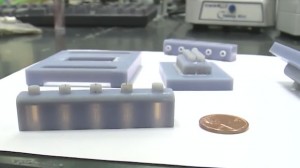NEW YORK (Reuters Health) – In patients with cystic fibrosis frequently treated for chronic Pseudomonas aeruginosa infection, aztreonam lysine for inhalation may be an effective add-on therapy, researchers report.
They note in the American Journal of Respiratory and Critical Care Medicine for November 1 that “antimicrobial treatment options for chronic P. aeruginosa airway infections remain limited, and additional therapies are needed to augment improvements in clinical outcomes.”
Their trial evaluated the efficacy and safety of an aerosolized formulation of the monobactam antibiotic aztreonam and lysine in 211 patients who had undergone at least three courses of treatment with tobramycin inhalation solution over the previous year, and whose FEV1 was between 25% and 75% of predicted values.
Lead author Dr. Karen S. McCoy, at The Ohio State University in Columbus, and colleagues at 56 centers in the US randomized the patients to treatment with 75 mg inhaled aztreonam lysine (n = 135) or placebo (n = 76), two or three times daily for 28 days, which was initiated at the end of a 28-day run-in period in which inhaled tobramycin 300 mg was used twice daily.
The primary efficacy endpoint during the subsequent 56-day monitoring period — “median time to need for additional antipseudomonal antibiotics”




